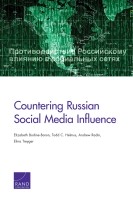| 来源类型 | Research Reports
|
| 规范类型 | 报告
|
| DOI | https://doi.org/10.7249/RR2740
|
| ISBN | 9781977401823
|
| 来源ID | RR-2740-RC
|
| Countering Russian Social Media Influence |
| Elizabeth Bodine-Baron; Todd C. Helmus; Andrew Radin; Elina Treyger
|
| 发表日期 | 2018
|
| 出版年 | 2018
|
| 页码 | 86
|
| 语种 | 英语
|
| 结论 |
- Russian social media disinformation campaigns can be viewed as a "disinformation chain," winding from Russian leadership, to Russian organs and proxies, through amplification channels such as social media platforms, and finally to consumers. This stylized model of a complex dynamic process is useful for categorizing and analyzing potential approaches for countering the threat.
- Experts agree that current efforts to combat Russian social media influence are fragmented and incomplete.
- Solutions are independently proposed (and sometimes implemented) by different stakeholders, but rarely are such stakeholders aware of what others are doing, to say nothing of paths of cooperation.
- Efforts to increase cooperation and information-sharing are nascent and lack the necessary resources and authorities to make much of a difference.
- As it currently stands, there does not appear to be a strategy that delineates tasks and responsibilities for an organized response to Russian disinformation operations in the United States.
- Experts also agree that while there is no one single solution to countering Russian social media influence, stronger cooperation between the government and the private sector is clearly needed.
- Without cooperation and coordination, efforts will remain piecemeal and inadequate, and the United States will remain vulnerable to influence campaigns by Russia and other adversaries.
|
| 摘要 |
- Establish clear and enforceable norms for acceptable behavior for states' and media entities' behavior on social media platforms.
- Coordinate U.S. executive and legislative branch activities.
- Institute a formal mechanism for information-sharing that includes key players from the U.S. government and private social media companies.
- Increase the transparency of social media platform policies and algorithms for detecting and removing disinformation and malicious behavior.
- Encourage and fund academia to develop better tools for identifying and attributing disinformation on social media.
- Prioritize defensive activities over punishments to shape Moscow's decisionmaking.
- Continuously assess the cost and impact of proposed solutions relative to the effectiveness of Russia's activities.
|
| 主题 | Information Operations
; International Law
; Russia
; Social Media Analysis
; United States
|
| URL | https://www.rand.org/pubs/research_reports/RR2740.html
|
| 来源智库 | RAND Corporation (United States)
|
| 引用统计 |
|
| 资源类型 | 智库出版物
|
| 条目标识符 | http://119.78.100.153/handle/2XGU8XDN/108894
|
推荐引用方式
GB/T 7714 |
Elizabeth Bodine-Baron,Todd C. Helmus,Andrew Radin,et al. Countering Russian Social Media Influence. 2018.
|
|
文件名:
|
x1541079043048.jpg
|
|
格式:
|
JPEG
|

|
文件名:
|
RAND_RR2740.pdf
|
|
格式:
|
Adobe PDF
|
除非特别说明,本系统中所有内容都受版权保护,并保留所有权利。